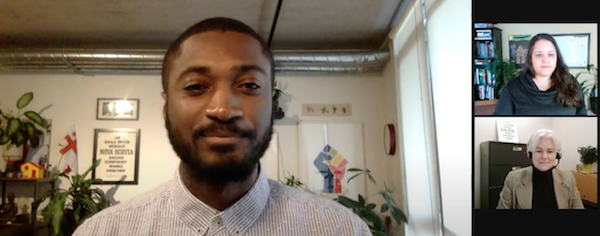News
» Go to news mainConversation at Promise Scholars panel event challenges the way EDI is prioritized in business

Clockwise from left: Alfred Burgesson, Mary Beth Doucette and Kim Brooks speak at a livestreamed event.
At the recent Atlantic Promise Scholars event Embracing Diversity: The Change We Need, panelists didn’t hesitate when sharing their perspectives on the imperative for equity, diversity and inclusion (EDI).
The systems and institutions we work in are inherently racist. The effort that’s needed is around dismantling systems that are unjust, according to panelist Alfred Burgesson, CEO of Tribe Network, a social enterprise that supports Black, Indigenous and People of Colour pursuing entrepreneurship and innovation.
Dalhousie’s Management Dean Kim Brooks moderated. She asked the panelists if they aren’t demotivated by having the same conversations about dismantling systemic racism multiple times.
Burgesson said on the contrary, it’s addressing the imbalance of power that exists in society that motivates him. “I’ve had an incredible amount of access to opportunities to create change and [ask myself] how do I now invite my peers, how do I invite folks who I know want an opportunity to be a part of this change … because I can’t dismantle these systems by myself,” he said.
Unprecedented change?
The Nov. 24 event was co-hosted by Dalhousie and Atlantic Promise Scholars partners Cape Breton University and Saint Mary’s University. It was streamed so audience members could watch from anywhere and ask questions. The recording can be viewed here:
Brooks opened the event by questioning whether, as a society, we are in a period of unprecedented change when it comes to understanding the barriers racialized people face.
Panelist Mary Beth Doucette (BEng ’04), an assistant professor and Purdy Crawford Chair in Cape Breton University’s Shannon School of Business who is also a Membertou band member and doctoral student in Management at Saint Mary’s University, shook her head. “When you listen to chiefs and Indigenous people who’ve been doing a lot of work to try and raise awareness about the equity issues that have existed in Canada for the last 150 years, no this is not a time of unprecedented change, it’s just a continuation of a lot of hard work.”
Moving forward
Doucette and Burgesson brought not only their lived experiences to the lively discussion, but also shared insights about the path forward.
Burgesson challenged the way learning is formally structured, saying students can grow and thrive through experiences outside the classroom that are often currently uncredited. “Sitting in the classroom is not the only form of education,” he said, suggesting we should place higher value on what happens externally and find ways to meet people where they are and to support the vitality of their own communities. He offered the example of a group of students he challenged to build a digital gateway, something they were able to do by coming together, gaining skills and confidence. Burgesson said we need to find ways to support students as students—not just future leaders in business.
Doucette agreed, saying that current evaluation metrics are wrong. She described how mentoring high school students can take many years before its effects are evident. You can’t evaluate students through quarterly reports, she said, questioning the metrics that funding programs often request.
Doucette also provocatively asked who are we talking about when we’re talking about the group dynamics of who needs to change? Is it the Atlantic Canada business schools? Leaders? Who is the who? She described how even word choices and phrasing can be alienating, offering the word “we” as an example. Many English speakers consider this an inclusive word, but it can have a much more exclusive interpretation by native Mi’kmaw speakers.
In the future, Burgesson said mentorship and sponsorship are some of the actionable ways white people can be stronger allies. But he said it goes beyond that. White people should look around the rooms they’re in groups and ask out loud, ‘Who is missing from this conversation’? He also said it’s important not just to get racialized people in the room, but to create conditions for them to feel safe, heard and valued.
The next Atlantic Promise Scholars panel event will be held in winter 2022. Learn more about the Atlantic Promise Scholars initiative.
Recent News
- Call for Submissions: Public Art Opportunity | Faculty of Management at Dalhousie University | Deadline: January 26th, 2026
- Jane Arnold, Archivist at Cape Breton University, Receives Outstanding Alumni Award
- MI Grad focuses on connecting people, communities and public institutions
- Jaime Landry (BMgmt’23): Entrepreneur, mentor and Dalhousie volunteer
- MPA grad focuses on women’s empowerment
- Management students travel overseas on behalf of Canadian exporters
- Online blended MBA elevates veterinary radiologist’s career
- Amrit Singh (BComm’25) wins top Frank H. Sobey Award
